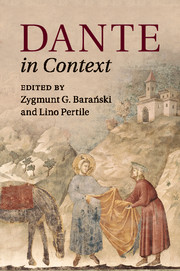Book contents
- Frontmatter
- Dedication
- Contents
- List of illustrations
- List of maps
- Notes on contributors
- Chronology
- Abbreviations and note on translations
- Introduction
- Part I Politics and society
- Part II Intellectual traditions
- Part III Linguistic and literary cultures
- 15 Linguistic Italy
- 16 Education
- 17 Rhetoric, literary theory, and practical criticism
- 18 Classical antiquity
- 19 Religious culture
- 20 Visions and journeys
- 21 Historical and political writing
- 22 Vernacular literatures
- 23 Popular culture
- Part IV Visual and performative culture
- Part V Dante: life, works, and reception
- Further reading
- Index
23 - Popular culture
from Part III - Linguistic and literary cultures
Published online by Cambridge University Press: 05 October 2015
- Frontmatter
- Dedication
- Contents
- List of illustrations
- List of maps
- Notes on contributors
- Chronology
- Abbreviations and note on translations
- Introduction
- Part I Politics and society
- Part II Intellectual traditions
- Part III Linguistic and literary cultures
- 15 Linguistic Italy
- 16 Education
- 17 Rhetoric, literary theory, and practical criticism
- 18 Classical antiquity
- 19 Religious culture
- 20 Visions and journeys
- 21 Historical and political writing
- 22 Vernacular literatures
- 23 Popular culture
- Part IV Visual and performative culture
- Part V Dante: life, works, and reception
- Further reading
- Index
Summary
The lofty status of Dante's Commedia may blind us to the potential of the poem to embrace folklore and other popular material. Dante's masterpiece may be regarded as embodying consummately high culture, and high culture is often presented as antithetical to popular culture. The divine or heavenly is set off against the earthly, and this opposition falls into place alongside other dichotomies, such as ecclesiastic and secular, clerical and lay, literate and illiterate, learned and unlearned, written and oral, and Latin and vernacular. As a consequence, a composition that has been stamped by its very author as sacral (Dante refers to it as ‘sacred poem’ in Paradiso XXIII, 62 and XXV, 1), and that has been hallowed for centuries by readers as ‘divine’ – hence the divine element in its conventional title – might seem to hold scant promise of incorporating popular religion, folklore, and other manifestations of earthliness.
Yet among Dante's works the Commedia, followed by first De vulgari eloquentia and then Monarchia, affords the richest resources in his oeuvre for an investigation and appreciation of the popular culture that surrounded him. The explanation for this is not far to be found. Whereas the other texts by Dante are more learned and literary, the Commedia has earned unique stature by virtue of its very comprehensiveness, as an encyclopaedia not only of lore but even of life as a whole. Its imaginative sweep takes in everything from Heaven to Hell, with a robust sampling of all (and not just Purgatory) that intervenes between the two.
In the poem Dante showed himself to be anything but walled off from the great wash of cultures and subcultures to which he won exposure during his journeys and sojourns in northern and central Italy. To all appearances, he clambered with the same freedom up and down the social ladder as he traversed the geographical space of the regions in which he wandered. In fact, he managed to achieve a startlingly inclusive panorama of the multifarious social world he inhabited, in the process absorbing alongside the obvious glitter of Latinate cultural literacy the varied vivacity of vernacular orality.
- Type
- Chapter
- Information
- Dante in Context , pp. 389 - 398Publisher: Cambridge University PressPrint publication year: 2015

